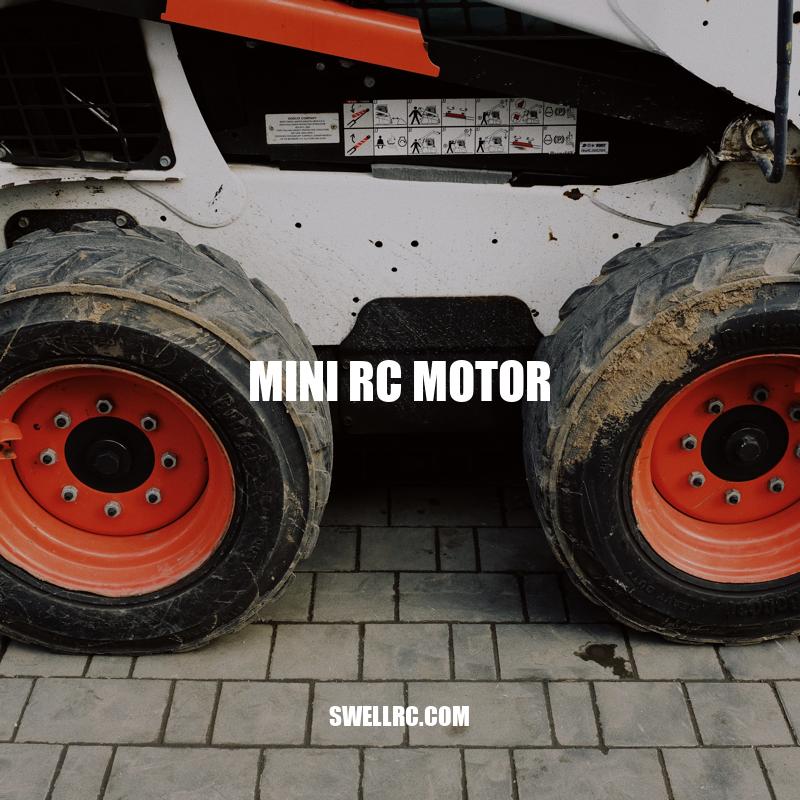Ultimate Guide to Mini RC Motors: Types, Applications, Maintenance and More
Mini RC motors are a crucial component in the world of remote control hobbyists. These tiny powerhouses give hobbyists the ability to create and customize their own miniature vehicles, from tiny drones to race cars that can achieve incredible speeds. Mini RC motors come in a wide range of shapes and sizes, each with their own unique advantages and disadvantages. They are available in both brushed and brushless options and are used to power a variety of different vehicles. If you are interested in the world of remote control vehicles, then understanding the basics of mini RC motors is a must. In this article, we will cover everything you need to know about mini RC motors, including the different types available, their primary applications, how to choose the right motor for your project, and how to maintain them for optimal performance and longevity. Let’s dive in!
Types of Mini RC Motors
When it comes to mini RC motors, there are several different types to choose from. Here are some of the most common types available:
- Brushed motors: These are the most common type of mini RC motor. They are affordable and easy to maintain, making them ideal for beginners. However, they tend to be less efficient than brushless motors.
- Brushless motors: These motors are more expensive than brushed motors but offer higher efficiency and longer lifespan. They are also more reliable and produce less heat, making them ideal for high-performance applications.
- Coreless motors: These motors are typically used in mini drones. They are lightweight and offer fast acceleration, making them ideal for acrobatic maneuvers. However, they tend to have a shorter lifespan than brushed or brushless motors.
When choosing a mini RC motor, it’s important to consider factors such as power, weight, and size, as well as the specific requirements of your RC model. Websites such as HobbyKing and Horizon Hobby offer a wide range of mini RC motors to choose from, along with helpful resources and customer reviews. By carefully selecting the right motor for your project, you can ensure optimal performance and a longer lifespan for your RC model.
Which motor is best for RC car?
When it comes to choosing a motor for an RC car, it really depends on the type of car and your intended use. Some popular options include brushed motors, brushless motors, and coreless motors. Here is a brief overview of each:
– Brushed motors: These are a traditional choice and offer good torque and control. They are generally more affordable than brushless motors and are great for beginners. Some popular options include the Traxxas Titan, HPI Racing Sprint 2, and Axial 27T.
– Brushless motors: These are more powerful and efficient than brushed motors and are a popular choice for high-end RC cars. They tend to be more expensive than brushed motors, but offer better speed and acceleration. Some popular options include the Castle Creations Mamba Monster, Hobbywing Xerun, and Novak 4.5T.
– Coreless motors: These are a newer type of motor and are becoming more popular thanks to their high efficiency and low maintenance requirements. They offer good power and torque, and are a popular choice for mini and micro RC cars. Some popular options include the Kyosho Mini-Z MR-03 and the Atomic AMZ.
Ultimately, the best motor for your RC car will depend on your specific needs and preferences. For more information on choosing a motor, you can visit websites such as RC Planet or HobbyKing, which offer a wide range of options and helpful guides.
Applications of Mini RC Motors
Mini RC motors are used in a variety of RC models, including cars, trucks, planes, and helicopters. Here are some of the most common applications of mini RC motors:
- Mini RC cars: Small-scale cars that can be driven on tabletops, indoors, or outdoors. These cars often use brushed or brushless motors for high-speed performance.
- Mini RC planes: Lightweight planes that can be flown indoors or outdoors. These planes often use brushless motors for optimal power and efficiency.
- Mini RC helicopters: Small-scale helicopters that can be flown indoors or outdoors. These helicopters often use coreless motors for fast acceleration and agile flight.
One interesting fact about mini RC motors is that they have become increasingly popular among hobbyists and RC enthusiasts in recent years. Thanks to advancements in motor technology, mini RC models are now more affordable and practical than ever before. Additionally, websites such as Amazon and Banggood offer a wide range of mini RC models and accessories to choose from, making it easier than ever to get started in the hobby.
What are mini motors used for?
Mini motors are small electric motors that are used for a range of applications. They are commonly used in robotics, RC models, and electronic devices such as cameras, smartphones, and drones. They are also used in the automotive industry to power components such as power windows and seats.
Mini motors have the advantage of being lightweight and compact, making them ideal for applications where space is limited. They are also energy-efficient, which is important in battery-powered devices.
If you are interested in purchasing mini motors online, there are several websites that offer a variety of options. Some popular sites include Amazon, AliExpress, and Banggood. Many manufacturers also have their own websites where you can browse their products and place orders directly.
When choosing a mini RC motor, there are several factors to consider to ensure that it is compatible with your RC model and meets your performance needs. Here are some factors to keep in mind:
- Size: Ensure that the motor is the right size for your RC model. A motor that is too big or too small can cause poor performance or damage to the model.
- Power requirements: Check the power requirements of your RC model and choose a motor that can provide adequate power. Brushless motors are often more powerful than brushed motors, but they can be more expensive.
- Weight: Consider the weight of the motor and how it will affect the balance and handling of your RC model.
- Battery and ESC compatibility: Ensure that the motor is compatible with your RC model’s battery and electronic speed controller (ESC).
- Propeller and gear compatibility: Choose a motor with the right shaft size to match the propeller or gear that you plan to use.
If you’re not sure which motor to choose, many websites offer guides and articles to help you make an informed decision. For example, RC Planet offers a guide on how to select the right motor for your RC model. You can also find a wide variety of mini RC motors on popular e-commerce websites such as Amazon and HobbyKing.
How do I choose the right motor for my RC plane?
Choosing the right motor for your RC plane depends on various factors such as weight, wing loading, desired speed and power, and propeller size. Here are some tips to help you choose the right motor:
- Calculate the wing loading of your plane in ounces per square foot. This will help you determine the required power-to-weight ratio.
- Factor in the weight and size of your battery and ESC when selecting a motor.
- Choose a motor that can handle the desired speed and power for your RC plane. Check the manufacturer’s specifications for thrust, RPM, and voltage.
- Refer to online resources and motor selection guides such as those found on websites like Motion RC or HobbyKing.
- Consider the availability and cost of replacement parts for the motor you choose.
Make sure to carefully research and compare different motors before making a final decision. Always follow manufacturer recommendations and guidelines for installation and operation.
Mini RC Motor Maintenance
Proper maintenance of your mini RC motor is essential to ensure it runs smoothly and lasts as long as possible. Here are some tips for maintaining your mini RC motor:
- Clean the motor regularly with a soft brush or compressed air to remove dirt and debris that can affect performance.
- Oil the motor bearings and bushings using lightweight oil to reduce friction and prolong their lifespan.
- Check for loose screws or damage to the motor housing and replace any damaged parts immediately.
- Monitor the motor temperature during use and avoid overloading it, which can cause overheating and damage to the motor.
- If you encounter motor problems such as low performance or unusual sounds, troubleshoot the issue by checking the wiring, connections, or ESC settings.
Some websites offer tutorials and articles on how to maintain your mini RC motor. For example, RC Groups has a forum discussion where you can ask questions or find answers about motor maintenance. You can also find motor maintenance kits and supplies on e-commerce websites such as HobbyKing and eBay.
How do you clean an RC motor?
To clean an RC motor, follow these steps:
- Remove the motor from the RC car.
- Use a small brush to remove any loose dirt or debris from the motor.
- Spray a cleaning solution onto the motor and let it sit for a few minutes.
- Use a brush to scrub the motor gently, being careful not to damage any parts.
- Rinse the motor thoroughly with water and let it dry completely.
- Reassemble the motor into the RC car.
It’s important to note that different types of RC motors may require different cleaning methods, so it’s always a good idea to consult the manufacturer’s instructions. Some cleaning solutions and brushes may also be better suited for certain types of motors.
If you’re looking for specific cleaning products or tools, websites like www.amainhobbies.com and www.rcplanet.com offer a variety of options.
Conclusion
In conclusion, Mini RC Motors are an essential component of the RC hobby industry, especially in the design and development of small RC models such as cars, trucks, planes, and helicopters. The type of motor chosen for the RC model depends on the size, weight, and power requirements of the model. Brushless motors are more expensive but more efficient and last longer than brushed motors. Proper maintenance of your mini RC motor is critical to ensure its longevity and optimal performance.
Before buying a mini RC motor, it is essential to consider several factors such as the voltage and size of the motor, the battery and ESC that will power it, and the type of propeller or gear it will drive. Buyers can find a wide range of mini RC motors and accessories on various e-commerce websites such as Amazon, eBay, and HobbyKing. The websites have a broad range of products and allow customers to compare prices and features and read user reviews before purchasing the mini RC motor of their choice.
Maintaining your mini RC motor includes cleaning and oiling the motor regularly, monitoring the motor temperature and avoiding overloading it, and troubleshooting any motor problems such as low performance or unusual sounds.
In conclusion, with proper maintenance and care, your mini RC motor can offer you long hours of enjoyable RC racing. So, go ahead and invest in a mini RC motor today and have a blast with your RC models.



